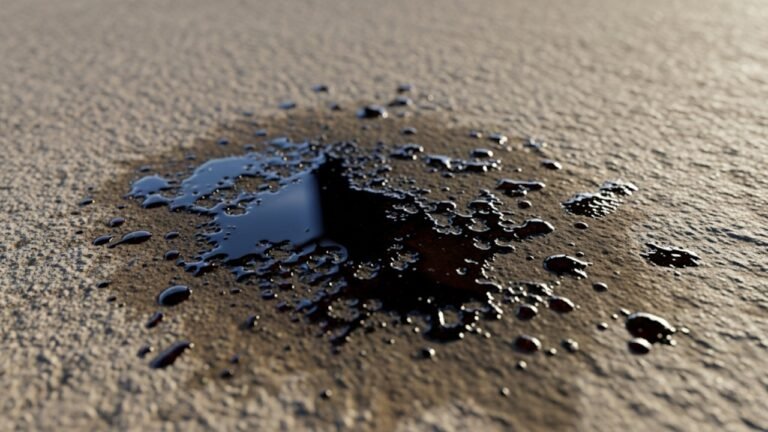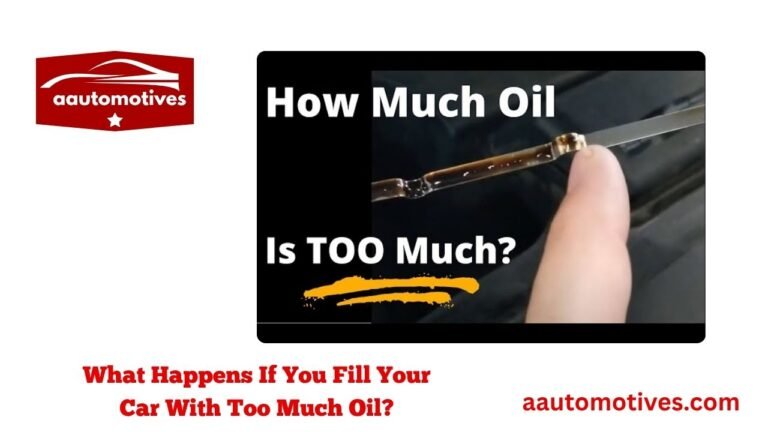What Happens When Your Car is Leaking Oil?

Have you ever walked to your car in the morning, coffee in hand, only to notice a little dark puddle underneath? You shrug, thinking maybe it’s nothing. A few days later, the spot grows, and suddenly, your engine sounds different. Sound familiar?
That tiny oil leak might not look like much, but trust me—it can cause serious trouble. From costly repairs to a total engine breakdown, what happens when your car is leaking oil is more than a messy driveway. It’s a sign your engine might be crying for help.
In this article, I’ll walk you through the signs, causes, risks, and solutions. You’ll also get some simple tips and personal stories that make this topic less “mechanic jargon” and more “real-life advice.”
Why Oil Matters More Than You Think

Here’s why oil is essential:
-
Lubrication: Reduces friction between engine parts.
-
Cooling: Keeps engine temperature in check.
-
Cleaning: Removes dirt and debris from inside the engine.
-
Protection: Prevents rust and corrosion.
Think of it this way: without oil, your car’s engine would be like running a marathon with no water. Eventually, things overheat and shut down. That’s why spotting and fixing a car oil leak early is crucial.
Signs Your Car Is Leaking Oil
Before you even pop the hood, your car often tells you something’s wrong. You just have to know how to listen—or look. Here are the most common signs of an oil leak:
1. Dark Spots Under the Car
You might notice black or brown stains on your driveway or parking spot. It’s the most obvious red flag. These spots usually get worse over time if left untreated.
2. Burning Smell
If oil is dripping onto hot engine parts, it can create a sharp, burnt smell. Some say it smells like burning toast. It’s not just unpleasant—it’s dangerous.
3. Low Oil Levels
Constantly topping off your oil? It might not be “burning off.” Your engine could be leaking it. Use your dipstick regularly to check oil levels.
4. Smoke from Engine Bay
Seeing smoke under the hood? That’s often caused by oil dripping on hot components like the exhaust manifold. Stop the car and check immediately.
5. Dashboard Warning Light
Modern vehicles often alert you with a low oil pressure light. If it’s on, don’t ignore it. It’s your car screaming for help.
What Causes an Oil Leak?
Understanding what happens when your car is leaking oil starts with knowing where the leak is coming from. Here are some usual suspects:
| Cause | Description | Repair Cost Estimate |
|---|---|---|
| Worn Gasket | Rubber seals degrade over time | $150–$400 |
| Damaged Oil Pan | Gets hit by road debris or rusts | $300–$800 |
| Loose Oil Filter | Improper installation after an oil change | $20–$75 |
| Cracked Engine Block | Severe damage, rare but serious | $1,000+ |
| Old Valve Cover Gasket | Common in high-mileage cars | $200–$500 |
Rubber parts harden with heat and age. If your car is older or you live in a hot climate, it’s even more likely that gaskets or seals are the root cause.
What Happens When Your Car Is Leaking Oil?
Here’s the core of the matter. When your car leaks oil, a chain reaction starts. At first, it may seem minor. But over time, that slow drip becomes a ticking time bomb.
Damage Escalates Quickly
With less oil, friction increases. Parts grind together. Metal wears down. The engine heats up more than it should. And before you know it, you’re dealing with serious mechanical failure.
Your Engine Overheats
Oil helps regulate temperature. If it leaks, your engine works harder and gets hotter. Constant overheating can warp parts and lead to total engine failure.
Fuel Efficiency Drops
Yes, leaks can affect fuel economy. When the engine isn’t lubricated properly, it burns more fuel just to do the same amount of work. You pay more at the pump and get less in return.
Environmental Damage
Leaking oil is terrible for the environment. It seeps into the ground, drains into water systems, and harms wildlife. That’s not just bad—it’s illegal in many areas.
Can You Drive With an Oil Leak?
Here’s the real talk: Technically, yes—but it’s a gamble. Small leaks might not seem urgent, but they don’t stay small forever. Every time you drive, you risk:
-
Total engine failure
-
Fire hazards from leaking oil near hot parts
-
Voiding your warranty
-
Turning a $50 fix into a $5,000 repair
A friend of mine once ignored a minor leak because “it was just a few drops.” A month later, his engine seized on the highway. The repair? Nearly $6,200. A $12 gasket could’ve saved him.
How to Check for an Oil Leak at Home
Don’t worry—you don’t need to be a mechanic. Here’s how to spot and confirm a leak:
Step-by-Step Checklist:
-
Park on clean pavement or cardboard
This helps you spot fresh leaks in the morning. -
Check the oil dipstick
Low oil means something’s wrong. -
Inspect around the engine
Look for oily residue near the oil pan, valve cover, or timing cover. -
Look under the car
Use a flashlight to spot fresh drips or shine on wet areas. -
Smell for burnt oil
It’s a distinct scent—once you know it, you’ll recognize it forever.
If you confirm a leak, don’t wait. Book an appointment or do a quick patch if you’re experienced.
Quick Fixes and Temporary Solutions
Let’s be real: sometimes you just need to buy time before a full repair. While not long-term solutions, these might help:
-
Oil Stop Leak Additives: These swell seals to slow minor leaks. Use sparingly.
-
Tighten Oil Filter and Drain Plug: These are often the cause after DIY oil changes.
-
Oil Pan Gasket Sealant: Temporary fix if you can’t replace the gasket yet.
But again—these are just band-aids. Eventually, you’ll need proper repairs.
When to See a Mechanic (And What to Expect)
If the leak is more than a few drops or your oil light stays on, it’s time to call in the pros. Mechanics will:
-
Pressure test the engine
-
Clean the area to trace the leak
-
Replace gaskets or seals
-
Refill and test oil levels
Expect to pay $150 to $600 for most common repairs. But catching it early can save you thousands in the long run.
How to Prevent Oil Leaks in the First Place
Fixing oil leaks can be expensive. But here’s the good news: with some basic habits, you can prevent most of them. Like brushing your teeth to avoid cavities, car maintenance saves you from bigger headaches.
Simple Prevention Tips:
-
Get regular oil changes
Don’t wait until your engine is gasping. Follow the manufacturer’s schedule or every 3,000–5,000 miles. -
Use high-quality oil and filters
Cheap oil breaks down faster. Quality matters here—your engine deserves the best. -
Inspect seals and gaskets
During routine checks or oil changes, ask your mechanic to look for wear and tear. -
Avoid rough driving
Hitting potholes or curbs can damage your oil pan or loosen parts. -
Keep an eye on dashboard lights
Don’t ignore the check engine or oil pressure lights. They’re there for a reason.
Think of your car like a relationship: a little attention goes a long way. Neglect leads to bigger problems—and sometimes breakups (with your wallet).
Long-Term Risks of Ignoring an Oil Leak
So, what really happens if you keep driving with an oil leak? Here’s what could go wrong—besides the obvious hit to your savings.
1. Complete Engine Failure
When there’s not enough oil to lubricate the parts, the engine overheats and eventually seizes. That means it just stops working—forever.
2. Engine Fire
Oil dripping onto hot engine components like the exhaust or turbo can ignite. This isn’t just a worst-case scenario; it happens more often than you’d think.
3. Permanent Engine Damage
Even without fire or failure, the internal damage caused by lack of lubrication is irreversible. Pistons, bearings, and cylinders wear out faster.
4. Increased Emissions
Oil leaks can affect how your engine burns fuel, leading to higher pollution. That might cause your car to fail an emissions test.
5. Voided Warranty
If you’re under warranty and you ignore a known issue like an oil leak, the manufacturer could deny coverage on engine repairs.
Bottom line: Oil leaks are not just messy—they’re deadly to engines.
Can an Oil Leak Hurt Your Car’s Resale Value?
Absolutely. Imagine trying to sell a car with a leak. Buyers will think you didn’t take care of it. Dealers may offer you less. Even private buyers will hesitate if they see oil spots or smell something off.
How Oil Leaks Hurt Resale:
-
Lower offers from dealerships
-
Negative inspection reports
-
Harder time passing emissions tests
-
Reduced trust in overall vehicle maintenance
I once tried to sell my old sedan. It was in good shape, but a tiny oil leak had stained the driveway. The first buyer walked away. Lesson learned: small leaks leave big impressions.
How Often Should You Check for Leaks?
You don’t need to be a car expert to stay on top of things. A few quick checks every month can prevent future disasters.
Maintenance Schedule to Avoid Oil Leaks:
| Task | Frequency |
|---|---|
| Check oil level | Weekly or before long trips |
| Inspect undercarriage | Monthly |
| Replace oil/filter | Every 3,000–7,500 miles |
| Look for gasket wear | Every 6 months |
| Full vehicle inspection | Yearly |
Your car might not speak, but these checks are how it whispers, “Help me.”
A Personal Story: “I Thought It Was Just a Spot”
Let me share a quick story.
A few years back, my cousin noticed a couple of dark spots on his driveway. He ignored it, thinking it was just leftover grime. Then came the burnt smell. The car started to stutter. Turns out the valve cover gasket had failed, and oil was dripping onto the alternator.
Repair cost? Nearly $1,100.
All because he didn’t act on a simple oil drip.
We all make mistakes, but stories like this show why being proactive is everything. Cars might be machines, but they depend on human attention to survive.
FAQs: What People Ask About Oil Leaks
1. Can I fix an oil leak myself?
Yes, if it’s something minor like a loose drain plug or oil filter. But gasket or seal replacements often require a mechanic.
2. Is a small oil leak okay?
Small doesn’t mean harmless. Over time, small leaks grow and can lead to big engine problems.
3. How long can I drive with an oil leak?
It depends on the leak’s severity. In general, don’t delay more than a few days. Driving long distances with a leak is risky.
4. Do oil leaks always smell?
Not always. Some leaks are slow and subtle. But if oil touches hot parts, you’ll smell it quickly.
5. Will an oil leak fail a car inspection?
Yes, in many states or countries, visible oil leaks can cause your vehicle to fail emissions or safety inspections.
6. Can oil leaks cause smoke?
Yes. If oil burns off the engine block or exhaust system, it creates white or blue smoke.
7. Does synthetic oil leak more than regular oil?
Not necessarily. But synthetic oil is more slippery, which may worsen leaks in already worn seals.
8. How much oil loss is too much?
If you’re adding oil more than once a month without a known reason, you likely have a leak.
Final Thoughts: Take That Drip Seriously
So, now you know exactly what happens when your car is leaking oil—and it’s not just about a few drops here and there.
It can lead to engine damage, expensive repairs, reduced fuel efficiency, fire risks, and lost resale value. But most importantly, it signals that your car needs your attention.
You don’t have to be a gearhead to understand that ignoring oil leaks is like ignoring a health issue. It might not hurt today, but it will hurt tomorrow—and maybe worse.
So, the next time you see a dark spot on your driveway, don’t just walk past it. Pop the hood. Check the dipstick. Schedule that inspection. Your car—and your wallet—will thank you.






